Mingmei Yip has been writing and publishing since she was fourteen years old and now she has twelve books to her credit. Her five novels are published by Kensington Books and her two children’s books are published by Tuttle Publishing. Mingmei is also a renowned qin (ancient string instrument) musician, calligrapher and painter. In Hong Kong, she was a columnist for seven major newspapers. She has appeared on over sixty TV and radio programs in Hong Kong, Taiwan, China, and the US. Visit her Website.
Last year, I really enjoyed Skeleton Women, and The Nine Fold Heaven picks up where the previous book ends. “An ex spy and nightclub singer who undertakes an emotional and dangerous journey to reunite with her lost lover and the baby she was told was stillborn, and to discover the secret of her parents’ murder.”

Nine Fold Heaven is part of a series about Camilla the songbird and female spy – you can also read Skeleton Women, the first book about Camilla.
Today, I’ve got a great guest post from Yip about her writing space. Please give her a warm welcome.
Writing space: I only write at home. I can’t write at cafes, since most have loud music which is a distraction for me. But when they play classical music, then I stop writing and listen, so that does not work for me, either.
I consider myself lucky to have a small room just for myself in my apartment which I use as my writing space. Luckily, my little room has a view of the north side of Manhattan and the East River. So, when I just can’t type anymore, I lift my head and soothe my eyes by staring at the peaceful scene outside the window. Soon I am refreshed and back at work.
I have decorated my writing room with some of my favorite things – books, plants, flowers, my own paintings and calligraphy. Writing is a solitary and difficult journey, so I try to fill my space with what I find both beautiful and spiritually inspiring. I also keep amulets next to me for protection, just in case.
Writing habits: I don’t have a chance to write every day, because like everyone else, I have other responsibilities in life. So when I have a chance to write, I write as much and as long as I can. This is like gorging yourself when you don’t know where your next meal is coming from. In any case, it is what works for me. It helps that I can take a nap whenever I want.
Writing tips: I plunge into writing and ignore everything around me. Since I was a tiny girl I have always preferred life inside my own head. Whenever I have writer’s block, I’ll read or watch a movie. This usually triggers ideas for me so I can go back to write. I also read a lot, not only to feed my imagination and creativity, but also to have a point of comparison for my own writing.
I think it is still essential to master the basics. Not only voice, characterization, dialogue, plot, but also sentence structure, its rhythm and music. I always try to vary the length of my sentences and start each one with a different subject. It’s essential to spent whatever time it takes to find the right word. Sometimes, it is a single word that brightens a whole paragraph.
There is a Chinese saying “Slap on the thigh and exclaim!” That’s how the readers will react to a good choice of word. Readers may not be aware of the meticulous hard work behind a smooth sentence, but if you don’t pay attention, they will soon become bored. I also think it’s good for authors to attend other cultural activities such as movies, concerts, art exhibitions. Have as diverse a background as you can cultivate, that really helps.
Most important, don’t give up! The ancient Chinese philosophy classic, the Daode Jing says more things are spoiled in the end than the beginning. Stick through to the end.
Thanks, Mingmei, for sharing your writing space with us, as well as your writing habits. I’m the opposite, too much quiet and I can’t write.








 I moved my workspace to the family room, the heart of my home. It has a big comfortable couch, blankets when I’m cold and it’s close to the kitchen. And most importantly, it had a television. Now I don’t recommend doing homework or writing a best selling book with the television on, but I have to say, with the right program, the white noise, keeps me sane and even focused. And sometimes, a particular program, a word, a thought, a plot twist can inspire something grand.
I moved my workspace to the family room, the heart of my home. It has a big comfortable couch, blankets when I’m cold and it’s close to the kitchen. And most importantly, it had a television. Now I don’t recommend doing homework or writing a best selling book with the television on, but I have to say, with the right program, the white noise, keeps me sane and even focused. And sometimes, a particular program, a word, a thought, a plot twist can inspire something grand.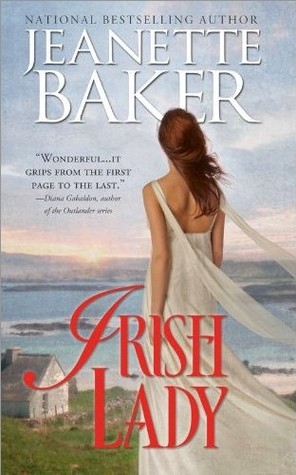
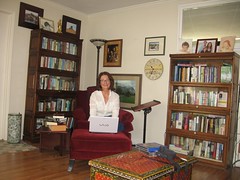 I love color and my space reflects it. My chair and ottoman are a deep garnet-red. A chest hand painted in gold, black and more red serves as a coffee table for my tea habit and the shelves of my bookcases are painted a dark, lacquered green. Even more than writing, reading is my passion. I surround myself with books, hundreds and hundreds of books, written by authors who inspire me, as well as photos of my family to remind me of my focus, and prints of Ireland and Scotland, the settings for many of my novels.
I love color and my space reflects it. My chair and ottoman are a deep garnet-red. A chest hand painted in gold, black and more red serves as a coffee table for my tea habit and the shelves of my bookcases are painted a dark, lacquered green. Even more than writing, reading is my passion. I surround myself with books, hundreds and hundreds of books, written by authors who inspire me, as well as photos of my family to remind me of my focus, and prints of Ireland and Scotland, the settings for many of my novels. I do a lot of my writing in my head before I commit anything to paper. When I’m writing my Jane Austen retellings, I start by rereading the original novel. If it’s a nice day, I do this outside, often going to a nearby stately home or formal garden so that I can soak up the elegant, leisurely atmosphere of days gone by. As I read, I let my mind wander over all the questions that occur to me. What was Henry like as a child and young man? What kind of relationship did he have with his parents and siblings? What was life like for him when his mother died? When did he discover a love for Gothic novels? Where did he read them?
I do a lot of my writing in my head before I commit anything to paper. When I’m writing my Jane Austen retellings, I start by rereading the original novel. If it’s a nice day, I do this outside, often going to a nearby stately home or formal garden so that I can soak up the elegant, leisurely atmosphere of days gone by. As I read, I let my mind wander over all the questions that occur to me. What was Henry like as a child and young man? What kind of relationship did he have with his parents and siblings? What was life like for him when his mother died? When did he discover a love for Gothic novels? Where did he read them? Sometimes I will start writing longhand, on a large notepad, and I often do this out of doors if the weather is good. I’ve written quite a few scenes sitting on the bench in the photo, which is at a nearby stately home. Then, once I’m in full flow I move onto the computer. My study is very plain, because once I get down to the actual business of writing, I don’t like distractions. The walls are a neutral colour without any pictures and there is no furniture apart from essential office furniture. My desk is large because I’m an untidy worker and I need space for all my notes, as well as my research books. I start off in an organised fashion, making neat notes in a word document, but I soon resort to scribbling things down on any piece of paper that comes to hand – an envelope, a copy of the Radio Times, anything. If I’m out, I make notes in a notebook I keep in my handbag, except when I forget it, which is often. Then I will scribble ideas down on an old receipt, train ticket or in fact anything that can be written on. I end up with a jumble of papers on my desk and I daren’t throw anything away in case it turns out to be vital.
Sometimes I will start writing longhand, on a large notepad, and I often do this out of doors if the weather is good. I’ve written quite a few scenes sitting on the bench in the photo, which is at a nearby stately home. Then, once I’m in full flow I move onto the computer. My study is very plain, because once I get down to the actual business of writing, I don’t like distractions. The walls are a neutral colour without any pictures and there is no furniture apart from essential office furniture. My desk is large because I’m an untidy worker and I need space for all my notes, as well as my research books. I start off in an organised fashion, making neat notes in a word document, but I soon resort to scribbling things down on any piece of paper that comes to hand – an envelope, a copy of the Radio Times, anything. If I’m out, I make notes in a notebook I keep in my handbag, except when I forget it, which is often. Then I will scribble ideas down on an old receipt, train ticket or in fact anything that can be written on. I end up with a jumble of papers on my desk and I daren’t throw anything away in case it turns out to be vital.
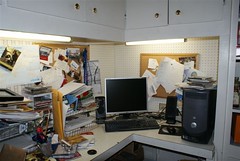 Up until six months ago, I wrote in my pantry. That’s right, my pantry. See, we have a small house, barely big enough for the four of us, so my husband created a writing space for me in our combined laundry room/pantry. It was big enough for my desktop and contained all of my writing miscellanea, as you can see. In the summer, it got pretty hot, so I wrote to the constant sound of a fan positioned at the doorway. In the winter, I kept warm from the dryer.
Up until six months ago, I wrote in my pantry. That’s right, my pantry. See, we have a small house, barely big enough for the four of us, so my husband created a writing space for me in our combined laundry room/pantry. It was big enough for my desktop and contained all of my writing miscellanea, as you can see. In the summer, it got pretty hot, so I wrote to the constant sound of a fan positioned at the doorway. In the winter, I kept warm from the dryer. And promptly got a very bad case of writer’s block. Too much light and air, I think. Too many distractions. It took awhile to get over that. I don’t take change well, and it was a shock to my system. Sometimes I find myself going into the pantry to sit down and write, only to be shocked with how my former space is taken up with household stuff.
And promptly got a very bad case of writer’s block. Too much light and air, I think. Too many distractions. It took awhile to get over that. I don’t take change well, and it was a shock to my system. Sometimes I find myself going into the pantry to sit down and write, only to be shocked with how my former space is taken up with household stuff.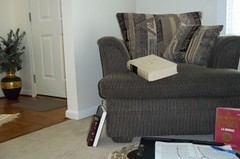




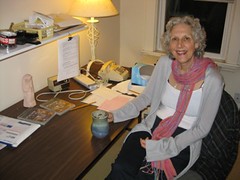
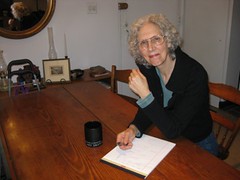
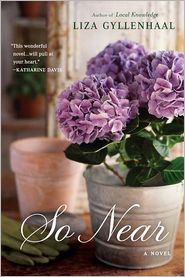 Today’s guest is
Today’s guest is 





 A month after the release of
A month after the release of  I’m impatient with my disorganized, scattered process. A no-nonsense voice tells me to sit up straight at my desk and focus. “Stop scribbling and start typing,” says that strident voice. “And for God’s sake get the cat off the table.”
I’m impatient with my disorganized, scattered process. A no-nonsense voice tells me to sit up straight at my desk and focus. “Stop scribbling and start typing,” says that strident voice. “And for God’s sake get the cat off the table.”


